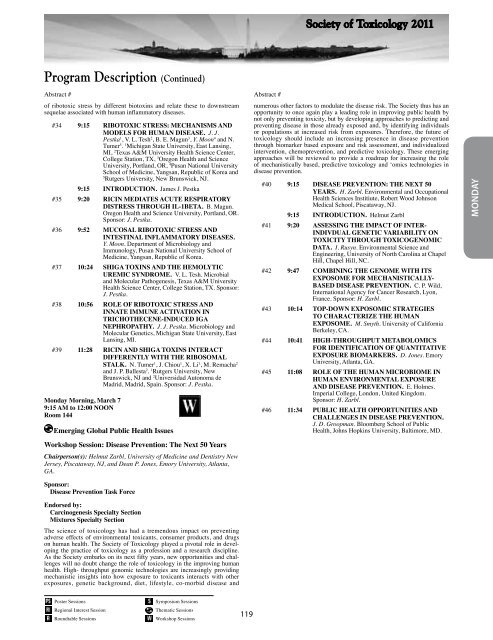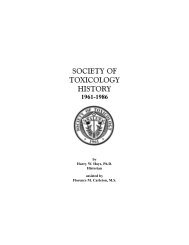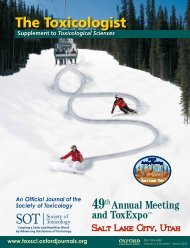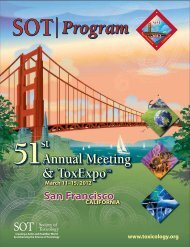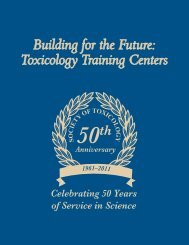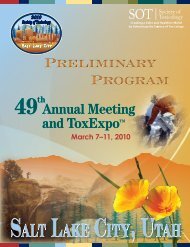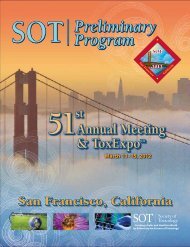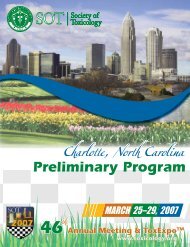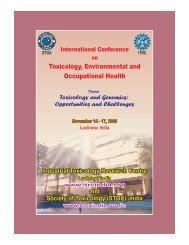Program - Society of Toxicology
Program - Society of Toxicology
Program - Society of Toxicology
You also want an ePaper? Increase the reach of your titles
YUMPU automatically turns print PDFs into web optimized ePapers that Google loves.
<strong>Society</strong> <strong>of</strong> <strong>Toxicology</strong> 2011<br />
<strong>Program</strong> Description (Continued)<br />
Abstract #<br />
<strong>of</strong> ribotoxic stress by different biotoxins and relate these to downstream<br />
sequelae associated with human inflammatory diseases.<br />
#34 9:15 RIBOTOXIC STRESS: MECHANISMS AND<br />
MODELS FOR HUMAN DISEASE. J. J.<br />
Pestka 1 , V. L. Tesh 2 , B. E. Magun 3 , Y. Moon 4 and N.<br />
Tumer 5 . 1 Michigan State University, East Lansing,<br />
MI, 2 Texas A&M University Health Science Center,<br />
College Station, TX, 3 Oregon Health and Science<br />
University, Portland, OR, 4 Pusan National University<br />
School <strong>of</strong> Medicine, Yangsan, Republic <strong>of</strong> Korea and<br />
5<br />
Rutgers University, New Brunswick, NJ.<br />
9:15 INTRODUCTION. James J. Pestka<br />
#35 9:20 RICIN MEDIATES ACUTE RESPIRATORY<br />
DISTRESS THROUGH IL-1BETA. B. Magun.<br />
Oregon Health and Science University, Portland, OR.<br />
Sponsor: J. Pestka.<br />
#36 9:52 MUCOSAL RIBOTOXIC STRESS AND<br />
INTESTINAL INFLAMMATORY DISEASES. <br />
Y. Moon. Department <strong>of</strong> Microbiology and<br />
Immunology, Pusan National University School <strong>of</strong><br />
Medicine, Yangsan, Republic <strong>of</strong> Korea.<br />
#37 10:24 SHIGA TOXINS AND THE HEMOLYTIC<br />
UREMIC SYNDROME. V. L. Tesh. Microbial<br />
and Molecular Pathogenesis, Texas A&M University<br />
Health Science Center, College Station, TX. Sponsor:<br />
J. Pestka.<br />
#38 10:56 ROLE OF RIBOTOXIC STRESS AND<br />
INNATE IMMUNE ACTIVATION IN<br />
TRICHOTHECENE-INDUCED IGA<br />
NEPHROPATHY. J. J. Pestka. Microbiology and<br />
Molecular Genetics, Michigan State University, East<br />
Lansing, MI.<br />
#39 11:28 RICIN AND SHIGA TOXINS INTERACT<br />
DIFFERENTLY WITH THE RIBOSOMAL<br />
STALK. N. Tumer 1 , J. Chiou 1 , X. Li 1 , M. Remacha 2<br />
and J. P. Ballesta 2 . 1 Rutgers University, New<br />
Brunswick, NJ and 2 Universidad Autonoma de<br />
Madrid, Madrid, Spain. Sponsor: J. Pestka.<br />
Monday Morning, March 7<br />
9:15 AM to 12:00 NOON<br />
Room 144<br />
Emerging Global Public Health Issues<br />
Workshop Session: Disease Prevention: The Next 50 Years<br />
Chairperson(s): Helmut Zarbl, University <strong>of</strong> Medicine and Dentistry New<br />
Jersey, Piscataway, NJ, and Dean P. Jones, Emory University, Atlanta,<br />
GA.<br />
Sponsor:<br />
Disease Prevention Task Force<br />
Endorsed by:<br />
Carcinogenesis Specialty Section<br />
Mixtures Specialty Section<br />
The science <strong>of</strong> toxicology has had a tremendous impact on preventing<br />
adverse effects <strong>of</strong> environmental toxicants, consumer products, and drugs<br />
on human health. The <strong>Society</strong> <strong>of</strong> <strong>Toxicology</strong> played a pivotal role in developing<br />
the practice <strong>of</strong> toxicology as a pr<strong>of</strong>ession and a research discipline.<br />
As the <strong>Society</strong> embarks on its next fifty years, new opportunities and challenges<br />
will no doubt change the role <strong>of</strong> toxicology in the improving human<br />
health. High- throughput genomic technologies are increasingly providing<br />
mechanistic insights into how exposure to toxicants interacts with other<br />
exposures, genetic background, diet, lifestyle, co-morbid disease and<br />
Abstract #<br />
numerous other factors to modulate the disease risk. The <strong>Society</strong> thus has an<br />
opportunity to once again play a leading role in improving public health by<br />
not only preventing toxicity, but by developing approaches to predicting and<br />
preventing disease in those already exposed and, by identifying individuals<br />
or populations at increased risk from exposures. Therefore, the future <strong>of</strong><br />
toxicology should include an increasing presence in disease prevention<br />
through biomarker based exposure and risk assessment, and individualized<br />
intervention, chemoprevention, and predictive toxicology. These emerging<br />
approaches will be reviewed to provide a roadmap for increasing the role<br />
<strong>of</strong> mechanistically based, predictive toxicology and ‘omics technologies in<br />
disease prevention.<br />
#40 9:15 DISEASE PREVENTION: THE NEXT 50<br />
YEARS. H. Zarbl. Environmental and Occupational<br />
Health Sciences Institiute, Robert Wood Johnson<br />
Medical School, Piscataway, NJ.<br />
9:15 INTRODUCTION. Helmut Zarbl<br />
#41 9:20 ASSESSING THE IMPACT OF INTER-<br />
INDIVDUAL GENETIC VARIABILITY ON<br />
TOXICITY THROUGH TOXICOGENOMIC<br />
DATA. I. Rusyn. Environmental Science and<br />
Engineering, University <strong>of</strong> North Carolina at Chapel<br />
Hill, Chapel Hill, NC.<br />
#42 9:47 COMBINING THE GENOME WITH ITS<br />
EXPOSOME FOR MECHANISTICALLY-<br />
BASED DISEASE PREVENTION. C. P. Wild,<br />
International Agency for Cancer Research, Lyon,<br />
France. Sponsor: H. Zarbl.<br />
#43 10:14 TOP-DOWN EXPOSOMIC STRATEGIES<br />
TO CHARACTERIZE THE HUMAN<br />
EXPOSOME. M. Smyth. University <strong>of</strong> California<br />
Berkeley, CA.<br />
#44 10:41 HIGH-THROUGHPUT METABOLOMICS<br />
FOR IDENTIFICATION OF QUANTITATIVE<br />
EXPOSURE BIOMARKERS. D. Jones. Emory<br />
University, Atlanta, GA.<br />
#45 11:08 ROLE OF THE HUMAN MICROBIOME IN<br />
HUMAN ENVIRONMENTAL EXPOSURE<br />
AND DISEASE PREVENTION. E. Holmes.<br />
Imperial College, London, United Kingdom.<br />
Sponsor: H. Zarbl.<br />
#46 11:34 PUBLIC HEALTH OPPORTUNITIES AND<br />
CHALLENGES IN DISEASE PREVENTION. <br />
J. D. Groopman. Bloomberg School <strong>of</strong> Public<br />
Health, Johns Hopkins University, Baltimore, MD.<br />
MONday<br />
Poster Sessions<br />
Regional Interest Session<br />
Roundtable Sessions<br />
Symposium Sessions<br />
Thematic Sessions<br />
Workshop Sessions<br />
119


